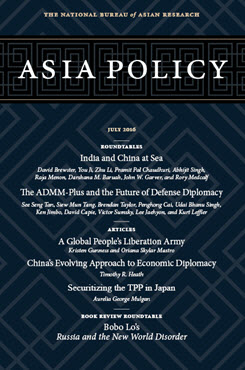The ADMM-Plus and the Future of Defense Diplomacy in the Asia-Pacific
This Asia Policy roundtable examines the strengths, weaknesses, challenges, and opportunities of the ASEAN Defence Ministers’ Meeting-Plus (ADMM-Plus) from the perspectives of ASEAN and the eight Plus countries—Australia, China, India, Japan, New Zealand, Russia, South Korea, and the United States.
The ADMM-Plus: Regionalism That Works? See Seng Tan
ASEAN and the ADMM-Plus: Balancing between Strategic Imperatives and Functionality Siew Mun Tang
A Pragmatic Partner: Australia and the ADMM-Plus Brendan Taylor
ASEAN’s Defense Diplomacy and China’s Military Diplomacy Penghong Cai
The Significance of the ADMM-Plus: A Perspective from India Udai Bhanu Singh
Anchoring Diversified Security Cooperation in the ADMM-Plus: A Japanese Perspective Ken Jimbo
New Zealand’s Interests in the ADMM-Plus: Multilateralism, Practical Cooperation, and a Rules-Based Regional Order David Capie
A Russian Perspective on the Relevance and Challenges of the ADMM-Plus Victor Sumsky
A South Korean Perspective on the Potential Contributions and Limitations of the ADMM-Plus Lee Jaehyon
The ADMM-Plus and the U.S. Department of Defense: Beyond the “Talk Shop” Paradigm Kurt Leffler
About Asia Policy
Asia Policy is a peer-reviewed scholarly journal presenting policy-relevant academic research on the Asia-Pacific that draws clear and concise conclusions useful to today’s policymakers. Asia Policy is published quarterly in January, April, July, and October and accepts submissions on a rolling basis. Learn more


